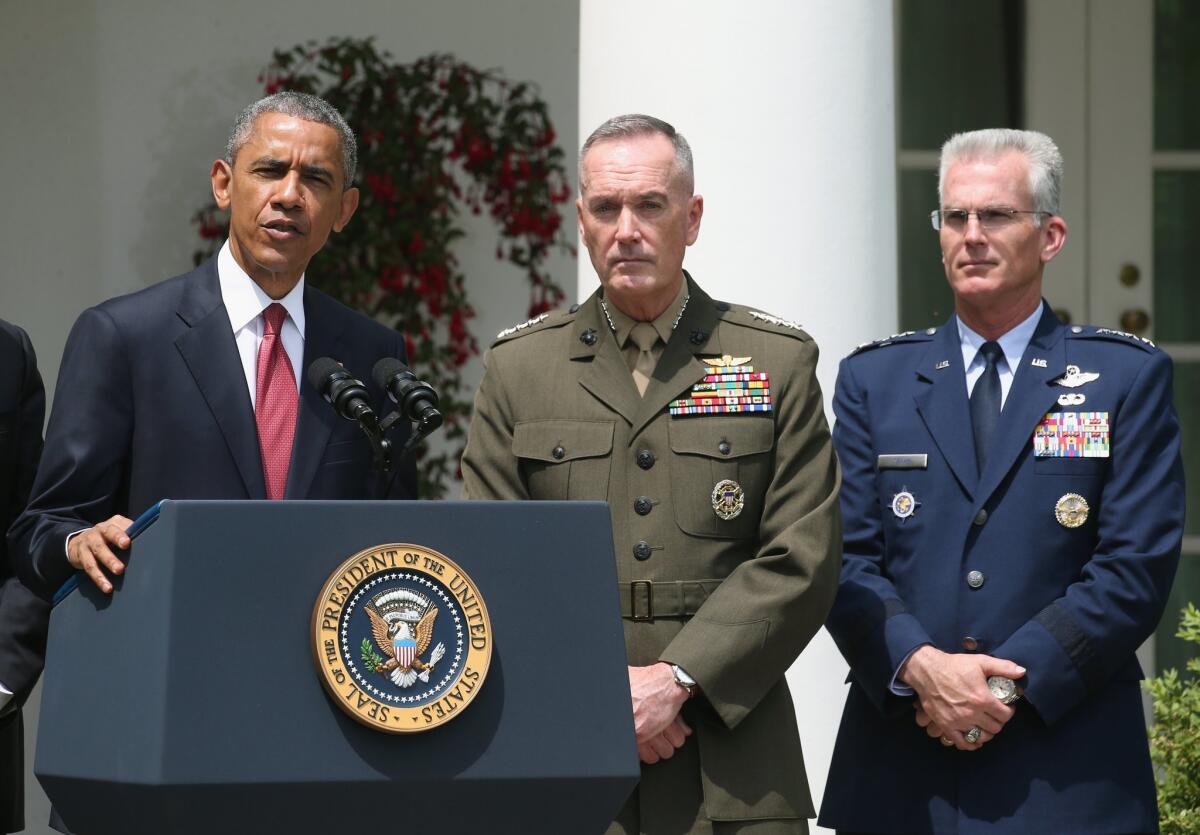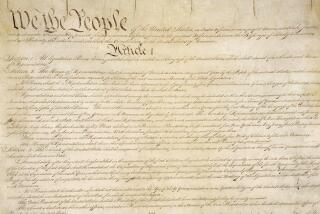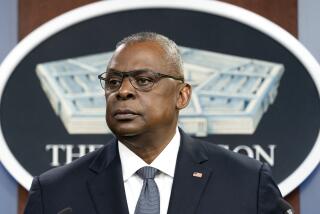Op-Ed: The new Joint Chiefs chairman should strive for independent thinking

President
President Obama has nominated Marine Corps Gen. Joseph Dunford to be chairman of the Joint Chiefs of Staff. Dunford waged war effectively in both Iraq and Afghanistan. But it’s one thing to be a battlefield commander, even a four-star theater commander, and another thing to be the chairman of the Joint Chiefs — a job that is more political than strictly military.
What kind of chairman will he be? History suggests that he will struggle to make his mark.
The chairman is not in the chain of command, which runs from the president to the secretary of Defense to combatant commanders, but he is in a position of great potential influence as the president’s primary military advisor and liaison between the armed forces and the White House. Yet few chairmen have wielded their office’s influence effectively.
Army Gen. Earle “Bus” Wheeler, chairman from 1966 to 1970, was typical. Along with the other chiefs at the time, he had considerable misgivings about how the Vietnam War was being conducted but he never effectively stood up to President Lyndon B. Johnson and Defense Secretary Robert McNamara. There was talk of the chiefs resigning en masse in protest, but such talk fizzled along with their authority.
Similar ineffectuality characterized Air Force Gen. Richard Myers, who served as chairman from 2001 to 2005, and Marine Gen. Peter Pace, chairman from 2005 to 2007. Their tenures covered the Iraq War, when U.S. armed forces were in danger of suffering their greatest defeat since Vietnam. Yet neither of them spoke out against the failed policies pursued by their military colleagues and by their boss, Secretary of Defense Donald Rumsfeld.
Unfortunately, the current chairman, Army Gen. Martin Dempsey, is following in their inglorious footsteps. In office since 2011, he too has been an enabler and apologist for political leaders pursuing losing strategies. Dempsey provided critical backing for Obama’s failure to intervene in Syria by stressing the risks of action and ignoring the risks of inaction. In the process he greatly exaggerated the difficulties of enforcing a no-fly zone. His arguments have been thoroughly discredited by the ease with which U.S. aircraft have penetrated Syrian air space since August 2014.
Dempsey has also been a font of happy talk supporting Obama’s inherently flawed Operation Inherent Resolve, which is designed to degrade and destroy Islamic State but cannot achieve that objective because of its limitations, imposed by the president: no “boots on the ground,” no direct support of Sunni tribes, and the training of the Free Syrian Army kept to a bare minimum. Instead of openly criticizing such decisions, which any chairman can do in testimony before Congress, Dempsey has offered his support and conveniently downplayed the gains of Islamic State in cities such as Ramadi, Iraq.
None of these generals was remotely as effective — for good and ill — as Army Gen. Colin Powell, chairman from 1989 to 1993. Powell did not succeed in blocking President George H.W. Bush from using force to expel Saddam Hussein’s army from Kuwait, but he was able to buttress that force, making Operation Desert Storm one of the most lopsided wars ever, in our favor. And he successfully lobbied to end the ground war at 100 hours because of the pummeling that fleeing Iraqi forces were taking along the so-called Highway of Death, though that decision left Hussein’s army intact to massacre Kurds and Shiites.
Powell’s influence expanded even more once a foreign policy novice, Bill Clinton, took over in the Oval Office. Powell took Clinton to school when the new president tried to intervene in Bosnia and to lift the ban on gays serving openly in the military. Powell, who had the stature and Washington savvy that Clinton, a newcomer from Arkansas, lacked, blocked both initiatives. Neither decision looks particularly good in hindsight, but that Powell was able to get his way shows how powerful he had become. (Powell did not exhibit similar influence or independence as George W. Bush’s secretary of State.)
Of more recent chairmen, only one stands out as an independent force in the Powell tradition: Adm. Mike Mullen, who served from 2007 to 2011. He first rankled the Bush administration by being skeptical of the surge in Iraq and favoring more outreach to Iran. Then he rankled the Obama administration by strongly supporting the surge in Afghanistan, which, the president said, left him feeling “boxed in.” On his way out of office, Mullen delivered a rare blast of truth against Pakistan, which has masqueraded as America’s friend while sponsoring terrorist groups that kill U.S. soldiers. His frankness caused considerable consternation in the Obama White House, but such opinions are important for presidents (and citizens) to hear and for democracies to absorb.
Dunford will no doubt be confirmed. Given the national security challenges facing the U.S., we can only hope he offers the president independent military advice and rejects the lapdog role of so many of his predecessors. An early test will be whether he blows the whistle on the ineffective strategy the administration is pursuing in Iraq and its nonexistent strategy in Syria.
Max Boot is a senior fellow at the Council on Foreign Relations and a contributing writer to Opinion.
Follow the Opinion section on Twitter @latimesopinion and Facebook
More to Read
A cure for the common opinion
Get thought-provoking perspectives with our weekly newsletter.
You may occasionally receive promotional content from the Los Angeles Times.






